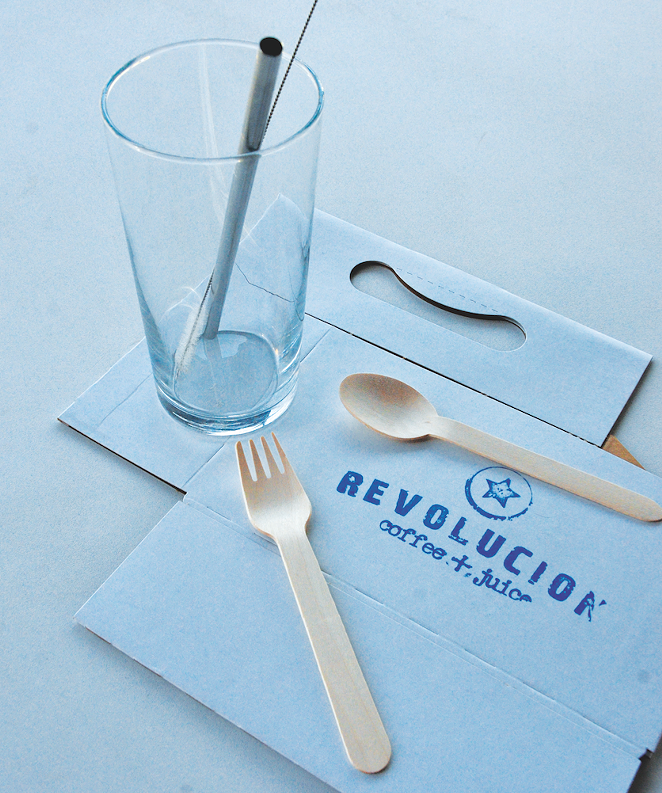Editor's Note: The following is The Big Spoon, an opinion column on San Antonio's food and drink scene.
I’m a sucker for straws. Blame it on my borderline addiction to iced coffee (or regular coffee for that matter). Blame it on growing up with a germophobe mom who gags at the sight of spots on dishes and poorly washed cups. Straws were our norm. We bought them in bulk and happily plucked them from their bin to suck down water, licuados, tea, soda, what have you.
Fast-forward 20-some odd years, and straws are still a huge part of my day-to-day drinking, whether it’s in the to-go cup picked up at the drive-thru, or the straw I chewed on while watching Black Panther, or the one in the glass of water servers dropped off at our table with breakfast/lunch/dinner.
The germ-averse sentiments linger. Though most shops will have an industrial washing station that takes care of washing, rinsing and sanitizing glassware, I was still holding strong to my straw.
One tiny little plastic can’t be all that offensive, can it?
According to the National Parks Service, my idea of a tiny straw, and everybody else’s, usually totals 500 million straws used daily. And as we know from Facebook, these often end up in oceans clogging the nasal cavity of some already endangered sea turtles.
Straws have turned into a cause du jour, and the moment has picked up steam. In 2017, a group of students known as the Coral Keepers of Whitehall Middle School in Whitehall, Mich., created National Skip the Straw Day. The day celebrated its sophomore year this February 23.
The city of Seattle will enact a ban this July that mandates all businesses selling food and/or drink “must offer compostable or recyclable options — or ask patrons to forgo the tools altogether” per the Seattle Times. The ban was part of a large push, billed as “Strawless in Seattle” and organized by leading Seattle business and cultural icons, to eradicate straw use. The initiative removed 2.3 million throughout the month of September.
This isn’t Seattle. We’re don’t have the Puget Sound to clearly show us the impact of straw-happy crowds, nor do we have big business backing a straw-free lifestyle.
Instead, we have Attorney General Ken Paxton suing cities like Brownsville for their $1 plastic bag environmental fee. The lawsuit was dropped after the city agreed to amend the ordinance.
Locally, San Antonio struggles to get a plastic bag ban off the ground (but hey, we have reusable Selena bags!), and straws are technically considered trash with no chance of being recycled, according to Marcus Lee, a spokesperson for the city’s Solid Waste Management Department. To be fair, SWMD is still struggling with teaching the populace not to toss diapers into blue bins.
But three businesses are working on doing their part. At Revolucion Coffee + Juice, Angie and Manny Carral have used compostable to-go containers and glass juice bottles since opening in 2012. They switched over to clinky, stainless steel straws two years later. At around 100 smoothies or cold drinks ordered daily, the couple saves at least 2,800 straws a month.
It doesn’t come cheap or easy.
The Carrals know the math doesn’t add up. For $25, they could easily order a box of 2,000 plastic straws online. A box of 10 stainless steel straws runs them the same amount. Then there’s the maintenance.
“We wash, rinse, sanitize and use special brushes to clean them completely, like we would a plate in a restaurant,” Angie said.
Of the 100 straws they keep on hand, 30 or so end up walking out the door or getting accidentally trashed.
At 5 Points Local, general manager Abby Johnson points to a bright green graphic with not-so-fun facts (“one person uses 38,000 straws in his whole life,” “it takes up to 200 years for a straw to degrade”) as to why the restaurant ditched conventional straws as of a month ago.
“I figured now was the time, even if it’s one little straw at a time,” Johnson said.
For Frances Lee, who opened Brew’s Lee Tea Station last November, providing an alternative to conventional straws has been a struggle. Lee offers silicone and bamboo straws for guests to purchase, but hoping they commit to the $9 additional charge for their take-home straw when customers are already paying $4.80-$8 for a split cup, which uses two straws, can be a bit of a pipe dream.
“I cannot force them,” Lee said, while noting she’s working with local wheat farmers to develop a cost-effective alternative within the next few months.
Still, she’s aware of the contribution the tasty drinks make to the straw problem, and that’s half the battle.
I’m trying to suck less these days. I’m working on becoming more aware of how often I use a straw and have only resorted to them when zipping through a drive-thru. And I’m carrying a newly acquired stainless steel straw (available in packs of eight with two cleaning brushes for $20 at Revolucion as of last week) in my Selena bag. Both are fun conversation starters.
— Jess Elizarraras, [email protected].
So many restaurants, so little time. Find out the latest San Antonio dining news with our Flavor Friday Newsletter.


